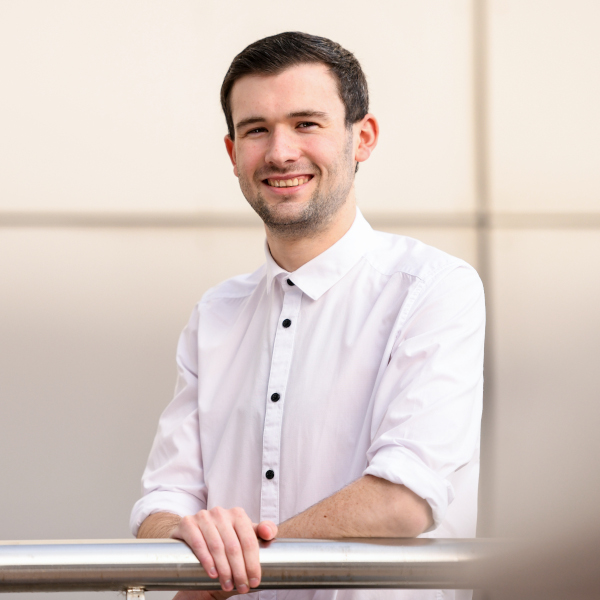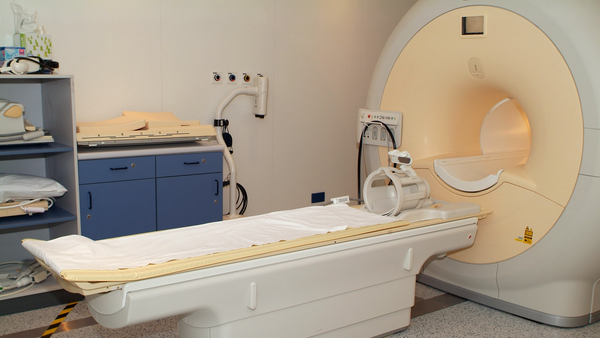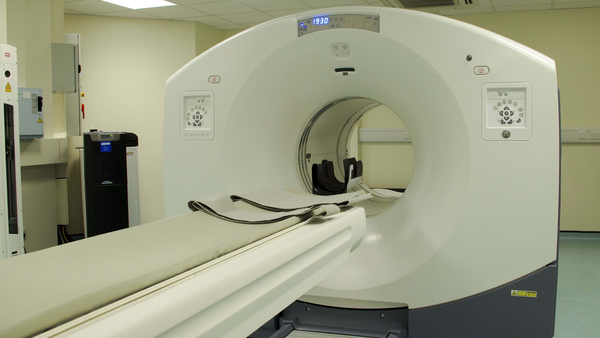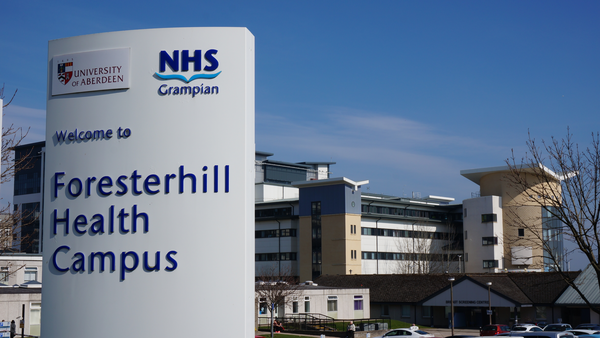Aidan Mackenzie

Our MSc in Medical Physics will improve your knowledge of how technology can help diagnose disease, while you learn about all the major aspects of physics as applied in the modern clinical/health environment. The programme is delivered in partnership with NHS Grampian.
This programme is available to start in January or September. Apply now
The University of Aberdeen has an internationally renowned reputation and an enviable history in developing new techniques for medical imaging, including being the first place in the world to build a whole-body sized Magnetic Resonance Imaging (MRI) scanner and conduct a diagnostic MRI scan.
On this MSc programme you will study such specialisms as nuclear medicine (which includes learning about diagnosing disease using radioactive tracers), radiotherapy and MRI. The programme is aimed at individuals who want to obtain an MSc from a top tier UK University. Applicants typically include recent physics and engineering graduates, people who are on the NHS Medical Physicists training programme and those in employment as medical physicists.
This programme is available to start in September or January.
The Medical Physics programme covers the full range of applications of physics to healthcare, including diagnostic imaging and radiotherapy. The curriculum is based on the requirements of the National Health Service (NHS) in the UK and the programme is accredited by the Institute of Physics and Engineering in Medicine (IPEM).
| Fee category | Cost |
|---|---|
| UK | |
| Tuition Fees for 2025/26 Academic Year | £11,100 |
| Tuition Fees for 2026/27 Academic Year | £11,100 |
| Tuition Fees for 2025/26 Academic Year (University of Aberdeen Graduates *) | £7,000 |
| Tuition Fees for 2026/27 Academic Year (University of Aberdeen Graduates *) | £7,000 |
| EU / International students | |
| Tuition Fees for 2025/26 Academic Year | £23,000 |
| Tuition Fees for 2026/27 Academic Year | £23,000 |
| Tuition Fees for 2025/26 Academic Year (Self-funded Students *) | £15,000 |
| Tuition Fees for 2026/27 Academic Year (Self-funded Students *) | £15,000 |
15 Credit Points
A study of the use of ionizing radiation for radiotherapy treatment. The course covers all aspects of radiotherapy physics including radiobiology of radiotherapy treatment, charged particle therapy, dosimetry, treatment planning, brachytherapy, radiotherapy equipment, quality assurance, safety and radiation protection in radiotherapy.
30 Credit Points
Core skills required for the MSc programmes in Medical Physics and Medical Imaging. These skills include academic writing, research methods (including statistics), mathematical skills required to reconstruct and process medical images as well as an understanding of the origins of radiation and its interactions with living tissues.
15 Credit Points
A study of computing and information technology as applied to medical physics and medical imaging. The aims of the course are: to introduce students to the applications of computing in a clinical context; to develop knowledge and skills in basic data management and medical image processing; to provide familiarity with standard data formats, networking and security in medicine; to introduce legal and safety aspects of information management in medicine and to introduce the principles of computer programming in a practical environment.
30 Credit Points
This course comprises a literature review of the wider field of investigation within a topic to be decided. Students will work with an expert in the field to define the aims of a project and a hypothesis that can be tested.
15 Credit Points
A study of the principles and applications of radioisotopes in diagnosis and therapy. The course covers nuclear medicine and positron emission tomography instrumentation and quality control, radiopharmacy, clinical practice, image reconstruction and analysis techniques, and research methods.
15 Credit Points
A study of the principles and applications of non-ionizing radiation in medical imaging. The course will cover the hardware, software and uses of both Magnetic Resonance Imaging and Ultrasound.
30 Credit Points
This course includes a data collection, computational or theoretical component, whereby students will perform the methodological and data-analysis components of a research project defined in Project Part 1 - Medical Physics. Students will work with an expert in the field to complete the aims of their project.
15 Credit Points
A study of the biomedical and safety topics relevant to Medical Physics, Medical Imaging and Bioengineering. This course is designed to provide the student with a fundamental understanding of several key biological topics which underpin medical imaging and medical physics.
15 Credit Points
A study of diagnostic radiology and of radiation protection principles and legislation. This course introduces UK Radiation Protection legislation covering ionising and non-ionizing radiation (lasers and UV) in hospitals and the guidance concerning their use.
| Fee category | Cost |
|---|---|
| UK | |
| Tuition Fees for 2025/26 Academic Year | £11,100 |
| Tuition Fees for 2026/27 Academic Year | £11,100 |
| Tuition Fees for 2025/26 Academic Year (University of Aberdeen Graduates *) | £7,000 |
| Tuition Fees for 2026/27 Academic Year (University of Aberdeen Graduates *) | £7,000 |
| EU / International students | |
| Tuition Fees for 2025/26 Academic Year | £23,000 |
| Tuition Fees for 2026/27 Academic Year | £23,000 |
| Tuition Fees for 2025/26 Academic Year (Self-funded Students *) | £15,000 |
| Tuition Fees for 2026/27 Academic Year (Self-funded Students *) | £15,000 |
We will endeavour to make all course options available. However, these may be subject to change - see our Student Terms and Conditions page. In exceptional circumstances there may be additional fees associated with specialist courses, for example field trips.
All eligible self-funded international Postgraduate Masters students starting in September 2025 will receive an £8,000 scholarship. Learn more about this Aberdeen Global Scholarship here.
To see our full range of scholarships, visit our Funding Database.
Our Medical Physics programme is taught through traditional lectures and practicals with some courses making use of seminars and specialised practical sessions. Many lectures are recorded and can be viewed again by students when required.
The MSc enables you to learn outside the classroom in our state-of-the-art facilities, including MRI scanners, the John Mallard Scottish PET Centre and the recently opened radiotherapy centre. This will enable you to apply both theory and practice to medical physics projects. You will also have many opportunities to engage with staff from the School of Medicine, Medical Sciences and Nutrition and Foresterhill Health Campus, one of the largest clinical complexes in Europe.
Some of the teaching methods employed in the programme include:
On-going support is provided by the University’s dedicated team of experienced researchers, who will be tutoring you.
Much of the teaching on this course involves participatory research work. Students are expected to engage with research work as well as classroom teaching and independent study in their own time.
Students are evaluated through continuous assessment in the form of essays, laboratory practicals, individual and group presentations and written examinations. The MSc project is assessed by a thesis and oral presentations of the project findings.
Each course throughout the programme is assessed by continuous assessment in the form of practical write-ups, essay assignments, student presentations and written examinations.
The information below is provided as a guide only and does not guarantee entry to the University of Aberdeen.
Physical science or Engineering second-class Honours degree. Minimum 2:2, 60% or GPA 2.4/4 or 3.0/5 overall.
Please check the In My Country or Territory pages to find out if your degree is equivalent.
Academic Technology Approval Scheme (ATAS) certificate
The CAH3 code for this degree is CAH07-01-01. Students who need a visa to live or study in the UK must to apply for ATAS clearance. The ATAS clearance certificate must be valid when you apply for a visa to enter the UK. To find out if you need to apply for ATAS clearance, please visit http://www.gov.uk/guidance/academic-technology-approval-scheme
Please enter your country or territory to view relevant entry requirements.
Eligible self-funded Postgraduate Taught (PGT) students will receive the Aberdeen Global Scholarship. Eligibility details and further information are available on our dedicated page.
Aberdeen Global ScholarshipTo study for a Postgraduate Taught degree at the University of Aberdeen it is essential that you can speak, understand, read, and write English fluently. The minimum requirements for this degree are as follows:
IELTS Academic:
OVERALL - 6.5 with: Listening - 5.5; Reading - 6.0; Speaking - 5.5; Writing - 6.0
TOEFL iBT:
OVERALL - 90 with: Listening - 17; Reading - 21; Speaking - 20; Writing - 21
PTE Academic:
OVERALL - 62 with: Listening - 59; Reading - 59; Speaking - 59; Writing - 59
Cambridge English B2 First, C1 Advanced or C2 Proficiency:
OVERALL - 176 with: Listening - 162; Reading - 169; Speaking - 162; Writing - 169
Read more about specific English Language requirements here.
You will be required to supply the following documentation with your application as proof you meet the entry requirements of this degree programme. If you have not yet completed your current programme of study, then you can still apply and you can provide your Degree Certificate at a later date.
Completing the MSc programme in Medical Physics at the University of Aberdeen will provide you with a solid base to pursue a career in healthcare and science, within hospitals, academic institutions and industry. You will develop the knowledge, understanding and practical insight that will enable you to help diagnose and treat disease using techniques such as nuclear medicine, MRI, medical electronics and computer technology and radiotherapy.
Some of the career options available to you include:
An MSc in Medical Physics from the University of Aberdeen will show employers that you have a broad knowledge base, first-hand research experience and the relevant skills required to bring value to their organisation. Links with the University, the John Mallard Scottish PET Centre and the Foresterhill Health Campus will enhance your credibility and help establish your reputation as a contributor to essential research projects.
The MSc programme meets the educational requirements of the Part I Training Scheme for Medical Physicists and Clinical Engineers in the UK’s National Health Service.
NHS Grampian
GE Healthcare
Philips Healthcare
Siemens Healthcare

The programme will be delivered by an experienced, multidisciplinary team of internationally renowned researchers and NHS staff.
You will be taught by a range of experts including professors, lecturers, teaching fellows and postgraduate tutors. However, these may be subject to change - see our Student Terms and Conditions page.

Our 3.0 T Philips Achieva research MRI scanner, is located in the Lilian Sutton Building (LSB) at Aberdeen Royal Infirmary (ARI) on the Foresterhill Health Campus.

The clinical PET scanner (a GE Discovery STe PET CT) is located in a purpose built facility, adjacent to the tracer development facility, nuclear medicine and MRI units.

The Foresterhill Health Campus is one of the largest clinical complexes in Europe which includes the Medical School, large teaching hospital, the Institute of Medical Sciences and the Rowett Institute.